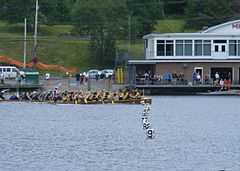Lake Banook
| Lake Banook | |
|---|---|
 A war canoe race on Lake Banook in 2009. | |
| Location | Dartmouth, Nova Scotia |
| Coordinates | 44°40′51.2″N 63°33′24.9″W / 44.680889°N 63.556917°WCoordinates: 44°40′51.2″N 63°33′24.9″W / 44.680889°N 63.556917°W |
| Primary inflows | Shubenacadie Canal |
| Primary outflows | Shubenacadie Canal, Sullivan's Pond |
| Basin countries | Canada |
| Max. length | 1210 m |
| Average depth | 38 ft |
| Surface elevation | 20 m |
| Settlements | Dartmouth |
Lake Banook is a freshwater lake located in Dartmouth within the Halifax Regional Municipality in Nova Scotia, Canada. It is home to three sprint canoe and kayak clubs, two rowing clubs, and has a claim to be the birthplace of ice hockey.
Location
Lake Banook's eastern shore is bordered by Prince Albert Road (part of Trunk 7) and its western shore fronts Crichton Park, a residential neighbourhood. At the south end of the lake is a lock mechanism leading to Sullivan's Pond. At the north end of the lake a bridge carries the Highway 111 expressway, informally known as the Dartmouth Circumferential Highway over its waters. The bridge also serves as a dividing line between Lake Micmac, also referred to as Second Lake.
Birch Cove Beach is the only beach on the lake that is currently supervised. Another beach, Graham's Grove, was closed in the early-1990s, as a result of poor water quality stemming from the construction of the nearby "Mic Mac Par-clo" (partial clover-leaf), a large interchange connecting Highway 111, Trunk 7, and Route 318, which replaced the rotary previously on the site.
Lake Banook has undergone many modifications. It was originally approximately two meters shallower than its current depth, after being dammed during the construction of the Shubenacadie Canal in the early 19th century. When the water rose, it submerged a small island. During improvements for the 1989 Junior World Championships, the top section of the paddling course was dredged to meet depth standards. The fill was used to expand nearby Graham's Grove Park, and the former access road still remains underwater. There have been shoreline modifications for recreational beaches, private waterfront, boat docks, and municipal pipelines. No natural shoreline remains on the lake.
Lake Banook has also become known internationally for a naturally occurring phenomenon which allows its water temperature to remain at relatively warm temperatures year-round. This is due to the large amount of sediment dumped into the lake during construction for the 1989 Junior World Championships. The high amount of phosphorus in the lake has led the water to remain at such a high temperature. Records dating back to 1989 indicate that the water temperature of Lake Banook has never fallen below 8.3 degrees, which was an all-time low in January, 1997. This makes Lake Banook a very desirable destination for paddlers, for the simple fact that they may train year-round without the requirement of a safety boat or lifejackets.
History
Lake Banook is named for the Mi'kmaq phrase for "first lake", as it is the first lake in the system that later became the Shubenacadie Canal. The Mi'kmaq people were the first to navigate the waters of Lake Banook, which contributed to the naming of Lake Micmac, Mic Mac Mall, and Mic Mac AAC. Hockey was played on Lake Banook as early as 1827, and certainly by 1850, though the game was then known as both rickets and wicket. Dartmouth claims the title of "Birthplace of Hockey, but this is disputed by both Windsor, Nova Scotia and Montreal. In 1864 Starr manufacturing of Dartmouth, located less than a kilometer from Lake Banook, began producing the world's first modern ice skates. Starr skates, first used on the lakes of Dartmouth including Lake Banook, later became a popular choice for elite ice hockey players, being worn by 6 out of 7 members of the 1902 Stanley Cup Champions Montreal Hockey Club. In the days before refrigerators, the lake was a source of ice for the residents of both Halifax and Dartmouth.
Since 1903, with the formation of the Banook Canoe Club, Lake Banook has been home to many competitive and recreational canoeists, kayakers, and rowers. Dartmouth has more paddlers per capita than anywhere else in Canada.
Sport
Lake Banook is home to three sprint canoe/kayak clubs, Banook Canoe Club, Senobe Aquatic Club, and Mic Mac Amateur Aquatic Club, as well as North Star Rowing. Mic Mac also has a rowing program. These clubs have developed multiple Olympians, National Champions, and World Championship team members. Lake Banook has an international-level course for canoe racing, as well as an official's tower and grandstands. Lake Banook has hosted many world-class competitions, including the canoe/kayak and rowing events at the inaugural Canada Summer Games in 1969, the World Junior Canoe Championships in 1989, the Senior World Championship in 1997, the World Marathon Championship in 2001, and the Senior World Championships in 2009.
References
- 2009 ICF Canoe Sprint World Championships official website
- Soil & Water Conservation Society of Metro Halifax (SWCSMH)
- Shubenacadie Canal
- http://www.banookcanoeclub.com/Handbook.html]